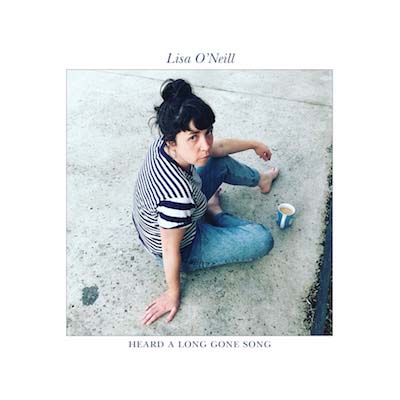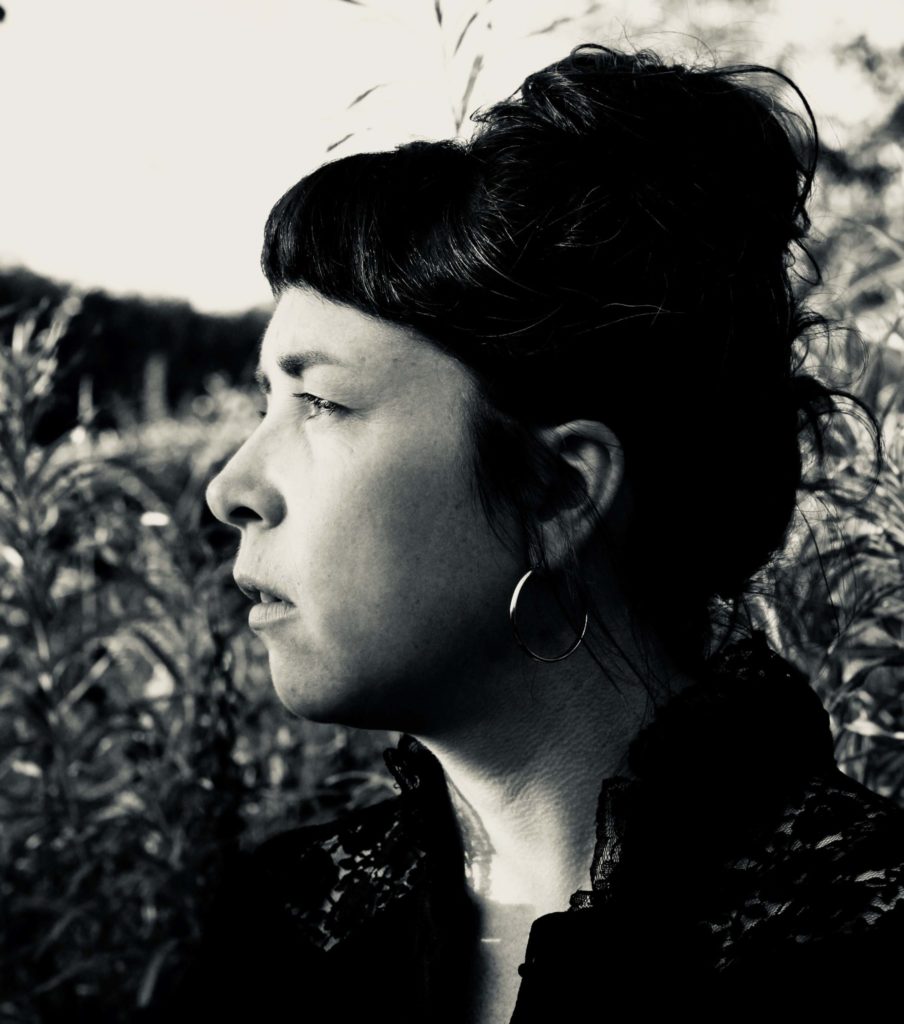- Music
- 05 Nov 18

Lisa O’Neill’s newest album, Heard A Long Gone Song, cements her place as one of Ireland’s greatest contemporary folk singers. The album is the first ever release on Rough Trade’s newest label River Lea, and comes at a time whenever folk music is getting renewed national attention – thanks to the inaugural RTE Folk Awards. But whatever else goes on around her, the Cavan songstress remains a collector, and disseminator, of important stories worth telling.
There’s a sense of déjà vu when I start interviewing Lisa O’Neill. I’ve already mulled over the questions and sent them to her a few days before, at her request. It’s the first time as a journalist that I’ve ever done this, but seems appropriate for a variety of reasons; Lisa and I have never met in person, she had a busy few years which she’d like to think about, and – perhaps most importantly – she doesn’t particularly feel comfortable during interview situations. Nevertheless, she’s forthcoming when we find ourselves seated in the Library Bar in Dublin city centre.
Heard A Long Gone Song, Lisa’s fourth album, was co-produced with Dave Odlum in Blackbox Studios in France, and finds O’Neill working with musicians such as Cormac Begley, Christophe Capewell, Libby McCrohan and Radie Peat across nine songs encompassing traditional ballads and original compositions. The press release describes the album as “a radiant document of an artist who feels more sure of her place in the world than ever before, while still retaining a sense of frailty”. In less flowery language, they’re songs that Lisa “collected” over the years and grew decidedly fond of singing.
Lisa’s previous album, Potholes In The Sky, was released in 2016 on Plateau Records. But thanks to the help of fellow folk upstarts, Lankum, Lisa found herself in contact with the prestigious Rough Trade Records, who were intrigued by her music.
“They asked me if I’d like to record an album based on what they’d heard,” she explains. From this, Heard A Long Gone Song went on to become the first album to be released on River Lea, the new folk-based imprint from Rough Trade’s Geoff Travis and Jeannette Lee, which is overseen and managed by Tim Chipping. The label is “dedicated to releasing beautiful and strange traditional folk music from the Britain, Ireland and beyond”, so it seemed entirely appropriate that Lisa would be the first pick.

Advertisement
“They’d asked to hear some traditional folk songs, but we talked about it and they were happy to take on an album which was half-original, half-traditional.”
Deal signed, she gathered those aforementioned folk stalwarts around her.
“It’s not necessarily the recording process that matters to me,” she continues. “It’d be people I’m working with, that’s what matters. You take Cormac Begley. He’s an amazing concertina. That’s what I’m looking for, people who are inspiring. Radie Peat as well. I play with great musicians and I listen to great musicians every day, so when I’m in the studio I like to work with great musicians.”
The same goes for producer Dave Odlum, who Lisa has an affinity with.
“I see Dave as an artist as well as a producer,” she says. “He has an incredible ear. I worked with him before and he produced my previous album. When I heard what he’d done with it, I thought, ‘I’m never going to have to work with another producer again.’ Unless he dies, of course. But sure if he dies, he has a brother...”
THE FAT-WALLETED AMERICANS
In a 9/10 Hot Press review of Lisa’s new album (“I’m wondering why I lost a star!” she jokes), we praised her “uncompromising” authenticity, when compared to a certain brand of folk music which “has been bastardised to a safe, homogenous diddly-eyed come-all-ye balladry that’s more about attracting fat-walleted American tourists to overpay for porter”.
Advertisement
“That’s some line isn’t it!” Lisa smiles.
It certainly is... When put in those terms, does she consider herself as ‘authentic’, compared to some of those folk singers?
She thinks about it. “Certainly there’s folk music out there that isn’t the real thing, but even then there’s something in that. There’s normally a reason they’re doing that. I think the majority of traditional musicians aren’t like that.
“Look, there’s always going to be Temple Bar, and there’s always going to be people who are in it for the money – and maybe there’s a place for that – but most of the people who I know, who maybe you haven’t heard of or who haven’t released music on a label yet, they’re doing it for the same reasons I am. It’s a form of communication. Folk music is a language. It’s a way of preserving a culture, preserving these stories. Most of the people I know do it to speak that language, to communicate with each other.”

VIOLET GIBSON AND THE WRENS OF CURRAGH
As if by way of illuminating this point, Lisa and I spend a few minutes talking about the story of the Wrens of Curragh, a group of prostitutes, alcoholics and socially-outcast women in 19th century Ireland who lived in nests – and obscurity – along the plains of Kildare. Their story is one of many in Irish history which has been reclaimed through word of mouth retellings and the folk tradition. Lisa tells me that she’d challenged Lankum’s Ian Lynch to write a song based on these women, and in return she’d write her own based on the life of Violet Gibson, the daughter of an Irish baron, who tried unsuccessfully to assassinate Mussolini. That particular song features on her new album.
Advertisement
“I hadn’t actually heard of Violet Gibson until Ian told me about it,” she admits. “So I looked her up and saw a documentary on her and thought, ‘This is a mad ould story.’ To think that this woman, who seemed to be doing well for herself, thought ‘Mussolini… sure I’ll take that man out!’”
Most of the original songs on the album came about through commissions. For example, ‘A Year Short Of Three’ – telling the harrowing story of an Aran fisherman whose son drowns out at sea – was written as part of a project with the National Gallery of Ireland.
“I was asked to respond to works in the Frederic William Burton: For the Love of Art exhibition,” says Lisa. “His most famous painting is The Meeting On The Turret Stairs, but I was really fascinated by this particular painting called The Aran Fisherman’s Drowning Child. It’s really intense image of a mother holding her drowned child, surrounded by her family and the community, and you can see in the painting the gleam of the child’s hair still wet. This intense inability to understand how something so awful could have happened. The song was a response to that.”
The highlight of the album is undoubtedly the lead single, ‘Rock The Machine’. The song formed part of the 2016 compilation album Starboard Home, which included reflections on the Dublin port and Dublin city. The song is told from the perspective of someone who works on the docks and has lost their job to expanding technology (“Machine has eaten up my job / My meaning, my cause / Machine with the strength of a hundred men / Can’t feed and clothe my children”).
“I knew very little about the manufacturing industry, but I was pondering the docks and what happened there. I was thinking about machines and unemployment.” She pauses. “I hate machines. I think it’s a shame what has happened for a lot of people. I hate these things,” she says, pointing to my phone, which is on the table recording our conversation. “We’re becoming consumed by them. We don’t think as much about communication, about intimacy. I think there’s a great loss there.”
RTÉ FOLK AWARDS
As we wrap up our interview, O’Neill mentions that she’s flattered to be nominated for Best Folk Singer at the first ever RTÉ Folk Awards, which take place in Vicar St. on October 27.
Advertisement
“It’s a bonus for me,” she says. “It means that singers like me are getting a lot of attention at the moment.”
Is folk going through a renaissance?
“It’s certainly getting attention. Maybe there’s something happening and people are more interested now, but it’s always been popular. It’s always been there. There’s always been great folk artists out there, awards or not. That’ll continue.”
Heard A Long Gone Song is out now.










